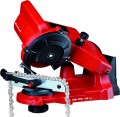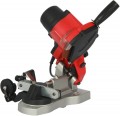Voltage
The rated voltage for which the machine is designed, or rather, the power format necessary for its operation (networks of different voltages differ not only in voltage, but also in current characteristics).
-
230 V. Connection to a standard household single-phase AC network, in other words, to a regular outlet. This option is convenient primarily for its simplicity and accessibility: there are sockets almost everywhere where there is a connection to the mains. The disadvantage of such a power supply is poor suitability for "gluttonous" high power equipment; at the same time, most modern sharpening/grinding/polishing machines have relatively low-power electric motors that work without problems from 230-volt networks. This option is the most popular today, only some professional-level units require more powerful power.
-
400 V. Three-phase AC networks provide high power supply, sufficient even for powerful industrial equipment. On the other hand, finding a connection to such networks is more difficult than a 230 V outlet, and powerful motors are very rarely used in the machines in question. As a result, this option also did not receive much distribution - usually 400 V power is a sign of a powerful industrial-grade machine.
-
12 V. Connection to car on-board networks with a voltage of 12 V - through a cigarette lighter socket or an auto socke
...t of a similar form factor). Such a tool can be indispensable when working away from outlets - if necessary, it can be powered from a car battery / generator. At the same time, such a need arises relatively rarely, and in domestic conditions it is easier to connect the machine to an outlet. Yes, and the power supply from the on-board network is very modest, which limits its use to small grinders for chains (see "Sharpening"), having a power of up to 100 W and intended mainly for servicing chain saws right on the job site. And some of them are generally compact machines held in the hands and not having a basis for a stationary installation.
— 12/230 V. Ability to connect the machine to both 230 V sockets and 12 V vehicle on-board networks. Both connection options are described in detail above. And their combination makes the machine more versatile in connection - however, on the other hand, the power of the unit is limited by the capabilities of automotive on-board networks, and in terms of capabilities such machines do not differ from "clean" 12-volt ones.Motor power
Rated power of the electric motor of the machine. The more powerful the engine, the higher the speed and intensity of processing can be, the larger discs can be used with the machine and the better it is suitable for working with hard, stubborn materials. On the other hand, a powerful motor consumes a lot of energy (which may require special connection — see "Power") and significantly affects the dimensions, weight and price of the entire unit. Therefore, manufacturers choose this parameter based on the type (see "Machine") and the desired characteristics of speed, productivity, etc. In fact, this means that engine power is rather a secondary parameter, and when choosing, it makes sense to pay attention to more practical points — disk diameter, rotation / movement speed, etc.
Disc diameter
Regular diameter of the disk (see "Working element") used by the machine for dry processing (see above). When grinding and polishing, usually, we are talking about the maximum diameter of the disk that can be installed on the tool — a larger nozzle will either be ineffective or not fit into the dimensions of the seat at all, but a smaller diameter disk, usually, is installed without problems (of course, if the hole diameter matches — see below). For grinding machines, the diameter of the disc corresponds to the diameter of the sanding pad, which is necessary for the full use of the disc.
The larger the regular disk — the heavier and more powerful the machine, usually, the better it can cope with complex work of a large volume. At the same time, for small everyday tasks like periodically sharpening knives or chisels, a small disc is quite enough.
Bore diameter
The bore diameter of the dry cutting discs (see above) used by the machine. In order for the nozzle to be used normally with the machine, it must match it not only in diameter and thickness (see the relevant paragraphs), but also in the size of the mounting hole.
Disc speed
The nominal speed of rotation of the disk for dry processing (see above), provided by the machine; for models with adjustable rotation (see below), the maximum rotation speed.
For the same disc diameter and material, a higher speed provides more intensive processing, and a slower rotation contributes to accuracy and precision. In addition, optimal speeds depend on the composition of the disc and the material being processed; detailed recommendations with specific figures for a particular situation can be found in special sources.
A separate category is grinding machines with disk-shaped working elements: in such units, the actual speed of movement of the disk surface relative to the workpiece depends on how close the contact point is to the centre of the disk.
Battery powered
Battery powered machines. Such power makes the tool autonomous and allows you to work even if there are no outlets nearby. On the other hand, it is not suitable for high power units, the machines themselves are heavier and more expensive than similar mains powered models; and the operating time is limited, and when the battery is exhausted, you will have to look for a power source and wait until it is charged. Yes, and it is not so often necessary to use grinding and grinding machines away from outlets. As a result, battery models have not received much distribution; these are mainly units for sharpening chains (see "Sharpening"), designed for use "on the road", away from the mains.

